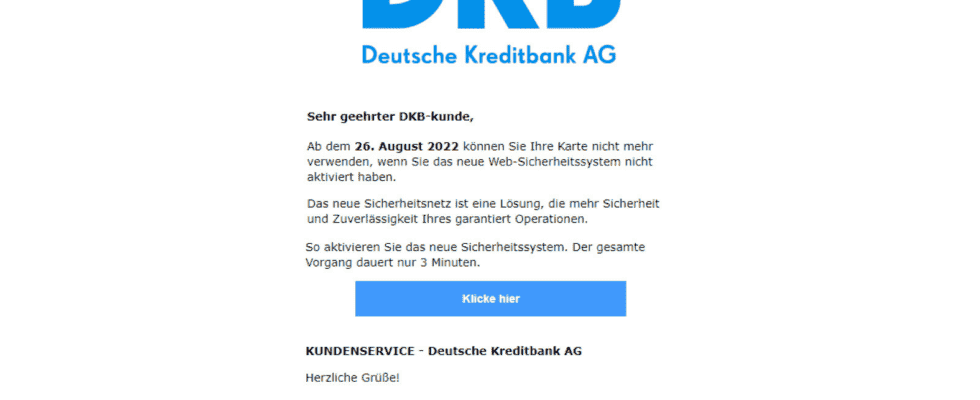If you have an account with the DKB (Deutsche Kreditbank AG), you could currently be the victim of a phishing scam. The scammers behind this threaten to block your card.
A security system in the DKB phishing mail serves as a pretext for data theft. (Source: consumer center)
- Scammers want to hack your DKB data and account with a phishing email.
- By blocking your card, they want to put pressure on you.
- Do not respond to the email and delete it.
Cyber criminals are trying their luck again with a phishing scam and want to get hold of your bank details. This time the customers of the DKB (Deutsche Kreditbank AG) are the target. In order to get your data, the scammers use well-known tricks.
In the mail you will be informed that your bank card has allegedly been blocked since August 26, 2022. A reactivation is to take place via a new security system. The supposed activation of the system, which should only take three minutes, takes place via an attached link with the inscription “Click here”.
However, if you click on the link, no security system will be installed. Instead, you end up on a fake website, as reported by the consumer advice center. Any personal and banking information you provide on the site falls straight into scammers’ hands. This way they can hack your account and misuse it.
We advise you to simply delete the e-mail and not to provide any data under any circumstances. If you have fallen for the scam, get in touch with your DKB contact person immediately.
Simple signs: This is how you recognize every phishing email
A first indication that you have received a phishing email: the email will ask you to confirm personal data or to enter it on a website. This Under no circumstances should you comply with the request. In addition, criminals often use the official logos of the companies they are copying in their emails, but not official sender addresses.
If you find the sender suspicious, you should read the email twice. You will often find spelling mistakes or inconsistencies in German grammar. The attackers usually do not write their emails themselves, but instead use automatically generated messages or translate known emails with a translation program. But why all the effort?
What do criminals achieve with phishing attacks?
Phishing is used on the Internet to collect real user data. Money can be made with these if e-mail addresses, names and other information are sold for advertising purposes or passed on in criminal forums. With the data obtained, cybercriminals can also address future phishing attacks in a more targeted manner, making their attacks more effective.
Did you receive a suspicious email?
Forward them to [email protected]
or follow us on:
Phishing Checklist
- ✔
Spelling mistake? - ✔
Sensitive data requested? - ✔
Official logos? - ✔
Unknown sender?
Attachments and links contained in malicious e-mails also often inject malware or viruses onto your computer. In addition, you should not simply ignore suspicious emails. Forward them to the above email address and help us report future phishing attacks.
More fraud alerts on netzwelt – stay one step ahead of cybercriminals
But phishing emails are not the only danger lurking on the internet. In addition to fraud attempts, there are all kinds of viruses, Trojans and malware that can infect your computer. Unfortunately, data scandals are also part of everyday digital life. You can see the five most recent articles on the subject of “Scam Alerts” below:
Do you want to stay informed about the latest fraud reports, Subscribe to netzwelt on Twitter, Facebook and Instagram. You can also find all articles on the subject on the next page.
Don’t miss anything with the NETWORK-Newsletter
Every Friday: The most informative and entertaining summary from the world of technology!
